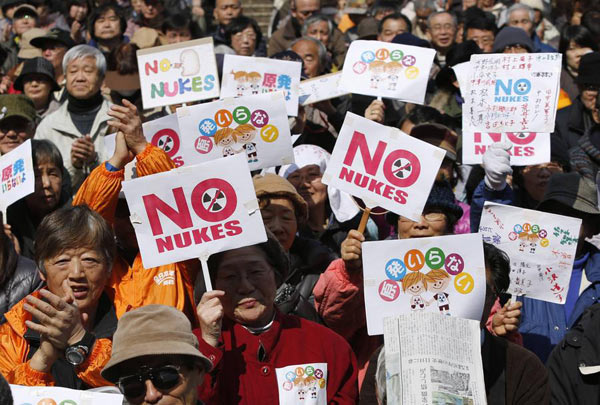 |
|
Anti-nuclear protesters hold banners saying "No Nukes" before they march in Tokyo March 9, 2014.? [Photo/Agencies] |
TOKYO - The Japanese government has not declared about 640 kg of unused plutonium in its annual report for the International Atomic Energy Agency (IAEA) in 2012 and 2013, an amount enough to make 80 nuclear bombs, local media reported Saturday.
|
 |
| Beijing calls on Tokyo to return plutonium to US? |
|
 |
| Tokyo urged to end militarism? |
Japan claims to own 44 tons of plutonium, while the actual amount is 45 tons, said Japan's Kyodo News Agency. The unreported plutonium is part of the plutonium-uranium mixed oxide (MOX) fuel placed at an offline reactor in a nuclear plant in Saga Prefecture, southern Japan.
The MOX fuel was loaded in March 2011, shortly before the Fukushima Nuclear Crisis happened later that month. Until two years later, the unused fuel was taken out from the reactor which remained offline.
An official from Japan Atomic Energy Commission argued that the plutonium is considered being used and hence exempt from reporting to the IAEA.
But plenty of experts both abroad and at home criticized the action of the Japanese government for failing to recognize the seriousness of the problem.
"From the safeguards point of view this material is still un- irradiated fresh MOX fuel regardless of its location," former IAEA Deputy Director General Olli Heinonen said. Thus the unreported plutonium could be diverted to as many as 80 nuclear bombs.
Japan keeps the largest number of plutonium among non-nuclear nations. The country used it for power generation in the past, but after the 2011 disaster at the Fukushima, Japan's nuclear reactors remain idle.
The big amounts of plutonium are causing regional worries over Japan's motives, as well as global concerns over the security of these nuclear fuel reserves.
